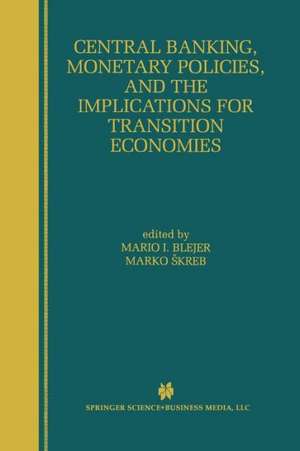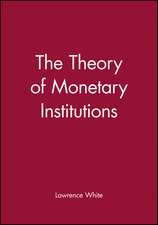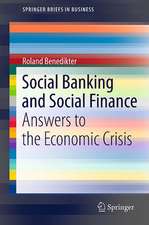Central Banking, Monetary Policies, and the Implications for Transition Economies
Editat de Mario I. Blejer, Marko Skreben Limba Engleză Paperback – 13 noi 2012
| Toate formatele și edițiile | Preț | Express |
|---|---|---|
| Paperback (1) | 1009.85 lei 6-8 săpt. | |
| Springer Us – 13 noi 2012 | 1009.85 lei 6-8 săpt. | |
| Hardback (1) | 960.42 lei 6-8 săpt. | |
| Springer Us – 30 iul 1999 | 960.42 lei 6-8 săpt. |
Preț: 1009.85 lei
Preț vechi: 1231.52 lei
-18% Nou
Puncte Express: 1515
Preț estimativ în valută:
193.23€ • 210.56$ • 162.83£
193.23€ • 210.56$ • 162.83£
Carte tipărită la comandă
Livrare economică 23 aprilie-07 mai
Preluare comenzi: 021 569.72.76
Specificații
ISBN-13: 9781461373650
ISBN-10: 1461373654
Pagini: 480
Ilustrații: XI, 465 p.
Dimensiuni: 155 x 235 x 25 mm
Greutate: 0.73 kg
Ediția:Softcover reprint of the original 1st ed. 1999
Editura: Springer Us
Colecția Springer
Locul publicării:New York, NY, United States
ISBN-10: 1461373654
Pagini: 480
Ilustrații: XI, 465 p.
Dimensiuni: 155 x 235 x 25 mm
Greutate: 0.73 kg
Ediția:Softcover reprint of the original 1st ed. 1999
Editura: Springer Us
Colecția Springer
Locul publicării:New York, NY, United States
Public țintă
ResearchDescriere
the adaptation of the institutional settings of monetary policy to deal with an emerging market economy had to be carried out in the midst of an unprecedented stabilization effort and, therefore, was particularly urgent and complicated. In many of the transition countries, the transformation effort implied not just changes in procedures but the establishment of a central bank from scratch, a process that involved an important effort, precisely at a time when the whole system was in serious turmoil. While the process of reforms is not yet completed in all the transition countries, an immense amount of progress has been achieved, and many of the transition countries face today monetary and central banking conditions that are close to those of Western economies. In this volume, we collect a number of important contributions that discuss the most burning aspects of the current debates on central banking and monetary policy and draw implications for the postsocialist transition economies. The various papers included in the volume deal with a broad set of related issues, which are highly relevant not just for transition economies but for other emerging markets and for advanced economies as well. The subjects covered in the book are divided into seven major categories (Sections II to VIII), some of which overlap.
Cuprins
I: Introduction. Central Banking and Monetary Policies: Major Issues and Implications for Transition Economies; M.I. Blejer, M. Skreb. II: Central Bank Independence. Central Bank Independence and Monetary Policy; J.A. Frenkel. Central Banking in a Democratic Society: Implications for Transition Countries; F.S. Mishkin. Central Bank Independence and the Political Business Cycle: A Critical Re-examination; A. Drazen. Political Culture and the Political Economy of Central Bank Independence; A. Hillman. III: Defining Central Bank Functions. Central Banking and Economic Development; M.J. Fry. IV: Central Banks and Financial Soundness. Central Banks, Asset Bubbles, and Financial Stability; G.G. Kaufman. The Conduct of Monetary Policy and Banking Soundness: A Slovenian Episode; V. Bole. V: Disinflation and the Role of Nominal Targets. Monetary Policy Strategies for Disinflation: Lessons from Recent Experiences in Transition Economies and Israel; G. Bufman, L. Leiderman. VI: Currency Crises and Capital Controls. Speculative Attacks and Capital Mobility; C. Wyplosz. Nascent Capital Flows, Learning and Chilean-type Controls; M. Selowski, R. Martin. The Role of the Central Banks in the Capital Account Liberalization: Case of Croatia; V. Sonje. VII: Currency Boards. Some Reflections about Currency Boards; S.H. Hanke. The Central Bank of Bosnia and Herzegovina: Its History and its Issues; W. Coats. VIII: EMU and Transition Economies. The International Impact of the Euroland and its Implications for Transition Countries; R.A. Mundell. Monetary and Exchange Rate Policy of Transition Economies of Central and Eastern Europe after the Launch of EMU; P.A. Masson.
















